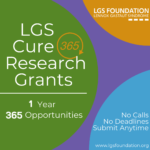2015 Grant Recipient – Candice Myers
Identifying Genetic Causes of LGS
Candice Myers, PhD
University of Washington
Highlights:
- Performed whole-genome sequencing and targeted next-generation sequencing on DNA from patients with developmental and epileptic encephalopathy (DEE) and Infantile Spasms (IS) to identify underlying genetic causes of DEE and IS
- Provide a causal link between DEE and the following genes: NTRK2, KCNB1, GNAO1, GABRB2, CLTC, GABBR2 and SNAP25
- Established a molecular diagnosis in 63 of 197 (32%) individuals
- These findings suggest that DEE and IS have a heterogenous genetic landscape with a high prevalence of de novo disease-causing variants.
Results:
Established a molecular diagnosis in 63 of 197 (32%) individuals:
- 53 cases due to de novo variants.
- 6 cases due to inherited mutations.
- 4 cases due to de novo copy number variants (CNVs).
Molecular diagnosis in DEE is the first step in personalized epilepsy care and has increased our understanding of neurogenetics; future research is needed to inform prognosis and therapeutic options.
Lay Abstract:
Developmental and epileptic encephalopathy (DEE) is a group of disorders characterized by the co-occurrence of epilepsy and intellectual disability, often accompanied by developmental plateauing or regression with frequent epileptiform activity. The underlying causes of DEE remain unknown in most cases.
To investigate potential genetic contributions, we performed whole-genome sequencing (WGS) on 197 individuals with unexplained DEE and drug-resistant seizures, along with their unaffected parents. Our primary focus was on de novo mutations (DNMs), identifying candidate genes containing such variants. To validate these findings, we:
- Conducted targeted sequencing in additional individuals with DEE.
- Mined sequencing datasets for further evidence.
- Performed meta-analyses to assess DNM enrichment by integrating our WGS data with other DEE studies.
 The LGS Foundation accepts unsolicited proposals year-round to seed new basic, translational, and clinical research projects on LGS. Projects may be funded at the $25,000, $50,000, or $75,000 level.
The LGS Foundation accepts unsolicited proposals year-round to seed new basic, translational, and clinical research projects on LGS. Projects may be funded at the $25,000, $50,000, or $75,000 level.
Updated 08/19/25 (KK)

